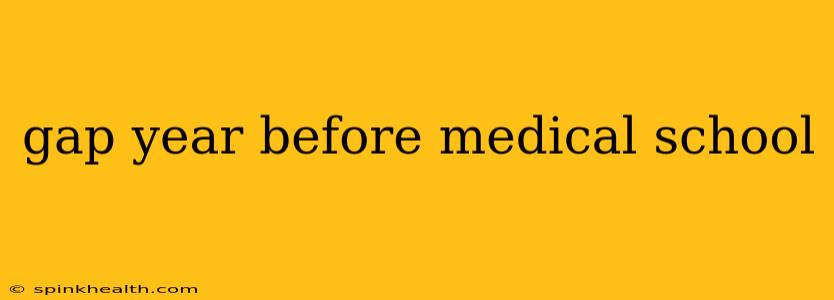The decision to take a gap year before medical school is a significant one, fraught with both excitement and apprehension. It's a crossroads where the rigorous academic journey you've already embarked on intersects with a potential period of self-discovery and exploration. This isn't just a break; it's an opportunity to enrich your application, bolster your resilience, and gain clarity on your path. But is it right for you?
This isn't a simple yes or no answer. Let's explore the complexities of this decision together, delving into the pros and cons and answering some common questions prospective medical students grapple with.
What are the Benefits of Taking a Gap Year Before Medical School?
Imagine this: you've spent years immersed in the relentless pursuit of academic excellence, sacrificing sleep, social life, and personal well-being for the coveted acceptance letter. Suddenly, you're faced with the prospect of launching directly into the demanding world of medical school. Exhausting, right? A gap year provides a much-needed respite, allowing you to recharge and refocus.
But the benefits extend far beyond a simple break. A well-planned gap year can significantly strengthen your medical school application in several ways:
-
Enhanced Clinical Experience: A gap year allows you to gain valuable hands-on experience in a clinical setting. This might involve volunteering at a hospital, working as a medical scribe, or even shadowing physicians. These experiences provide invaluable insights into the realities of medical practice and demonstrate your commitment to the field.
-
Improved Research Skills: Undertaking research during your gap year allows you to develop critical research skills, contributing to a publication or presenting your findings at a conference. This demonstrates initiative, intellectual curiosity, and a commitment to scientific inquiry – all highly valued by medical schools.
-
Development of Non-Clinical Skills: Medical school requires more than just scientific aptitude. It demands teamwork, communication, leadership, and resilience. A gap year can provide opportunities to develop these skills through volunteering, working in a team-based environment, or pursuing a passion project.
-
Strengthened Application: By gaining relevant experience and developing valuable skills, you enhance your application, making you a more competitive candidate.
-
Increased Self-Awareness: Perhaps the most crucial benefit is the opportunity for self-reflection and personal growth. A gap year allows you to assess your motivations for pursuing medicine, solidify your commitment, and ensure this is the right path for you.
What are the Potential Drawbacks of Taking a Gap Year Before Medical School?
While a gap year offers numerous advantages, it's essential to acknowledge the potential drawbacks:
-
Increased Financial Burden: Gap years often require financial planning, as you may need to cover living expenses and the costs associated with any activities you undertake.
-
Potential for Application Weakness: If a gap year isn't structured well, it may not significantly enhance your application. A poorly planned gap year might even weaken your candidacy.
-
Loss of Momentum: Some students may find that a year away from academics can disrupt their learning momentum and make the transition back to medical school challenging.
How Can I Make the Most of My Gap Year Before Medical School?
Planning is key to maximizing the benefits of your gap year. Consider these points:
-
Define Your Goals: What do you hope to achieve during your gap year? Set clear and achievable goals that align with your medical school aspirations.
-
Seek Mentorship: Connect with physicians or medical students who can provide guidance and support.
-
Network Strategically: Attend conferences, join relevant organizations, and build relationships with professionals in the field.
-
Maintain Academic Engagement: Consider taking a course or continuing your learning in some capacity to stay sharp.
How will a Gap Year Affect My Medical School Application?
This is frequently a concern. Medical schools understand that a gap year can be beneficial. It's about how you present it. A well-structured and purposeful gap year, documented effectively in your application, can demonstrate maturity, self-awareness, and a commitment to the medical field. Conversely, a poorly planned gap year with little to show for it might raise questions about your commitment or ability to manage your time effectively.
Should I Work During My Gap Year Before Medical School?
Working during your gap year can provide financial independence and valuable work experience. However, be mindful of balancing work commitments with other planned activities such as volunteering or research.
Is it Too Late to Take a Gap Year Before Medical School?
The timing of your gap year is crucial. Consider the deadlines for medical school applications and factor in the time needed to complete any activities you plan during your gap year.
What are Some Examples of Productive Gap Year Activities?
Examples of productive gap year activities include: clinical volunteering, research experience, working as a medical scribe, shadowing physicians, or pursuing relevant extracurricular activities.
In conclusion, the decision to take a gap year before medical school is a deeply personal one. Weigh the pros and cons carefully, plan thoughtfully, and ensure that your gap year is a strategic investment in your future medical career. With careful planning and execution, a gap year can be a valuable asset, propelling you forward on your path to becoming a physician.

